An electronic debit card, often simply called a debit card, is a payment card that deducts funds directly from your linked bank account when you make a purchase. Unlike credit cards, which offer a line of credit you can borrow against, debit cards use your own money. This makes them a convenient and widely accepted way to pay for goods and services both online and in physical stores. This guide will delve into the specifics of electronic debit cards, answering common questions and clearing up any confusion.
How Does an Electronic Debit Card Work?
When you use your debit card, the transaction is processed through a network like Visa, Mastercard, or Discover. The point-of-sale (POS) system at the merchant verifies the transaction with your bank, and the funds are immediately deducted from your checking or savings account. This immediate transfer of funds is the key difference between a debit and credit card.
Some debit cards offer additional features, like contactless payment (tap-to-pay) for faster transactions, and many are integrated with digital wallets like Apple Pay or Google Pay for added convenience and security.
What are the Different Types of Debit Cards?
While the basic function remains the same, there are nuances:
- Standard Debit Cards: These are the most common type and offer basic debit card functionalities.
- Debit Cards with Rewards Programs: Some banks offer debit cards linked to rewards programs, allowing you to earn cash back, points, or miles on purchases. These programs often come with stipulations and may not be as generous as credit card rewards.
- Prepaid Debit Cards: These cards are loaded with a specific amount of money beforehand and can't be used beyond that balance. They're useful for budgeting and managing spending, but lack the convenience of direct linking to a bank account.
What are the Advantages of Using an Electronic Debit Card?
- Spending Control: You can only spend the money you have in your account, preventing debt accumulation.
- Convenience: Debit cards are widely accepted, providing a seamless payment experience both online and offline.
- Security: Most debit cards offer fraud protection and dispute resolution mechanisms.
- Accessibility: Debit cards are relatively easy to obtain, especially if you have a bank account.
- No Interest Charges: Unlike credit cards, debit cards don't accrue interest charges.
What are the Disadvantages of Using an Electronic Debit Card?
- Overdraft Fees: If you spend more than you have in your account, you may incur overdraft fees from your bank.
- Limited Credit History: Using a debit card alone won't build credit history, which is crucial for securing loans or mortgages in the future.
- Lower Purchase Protection: Compared to credit cards, debit cards typically offer less robust buyer protection.
- Acceptance Issues in Some Locations: While widely accepted, there might be instances where smaller businesses or international vendors may not accept debit cards.
How Secure are Electronic Debit Cards?
Debit cards benefit from robust security features like EMV chip technology and fraud monitoring systems. Many banks offer zero-liability policies, meaning you're not held responsible for unauthorized transactions. However, it's crucial to practice safe habits like protecting your PIN, monitoring your account regularly, and reporting any suspicious activity immediately.
What Happens if My Debit Card is Lost or Stolen?
If your debit card is lost or stolen, immediately contact your bank to report it and request a replacement card. This will prevent unauthorized transactions and protect your funds. Many banks offer online tools to manage your debit card and temporarily block transactions until a new card is issued.
Can I Use My Debit Card Internationally?
Most debit cards can be used internationally, but it's essential to inform your bank of your travel plans beforehand. Failure to do so could result in your card being blocked due to unusual activity. Additionally, be aware of foreign transaction fees that may apply.
What is the Difference Between a Debit Card and a Credit Card?
The fundamental difference lies in the source of funds. Debit cards use your existing money, while credit cards provide a line of credit you borrow against and repay later. Credit cards build credit history, offer more buyer protection, and often have rewards programs, but come with the risk of accumulating debt and interest charges.
This comprehensive overview covers the key aspects of electronic debit cards. Choosing between a debit and credit card depends on your individual financial needs and spending habits. Remember to always review the terms and conditions of your specific debit card and bank policies.
